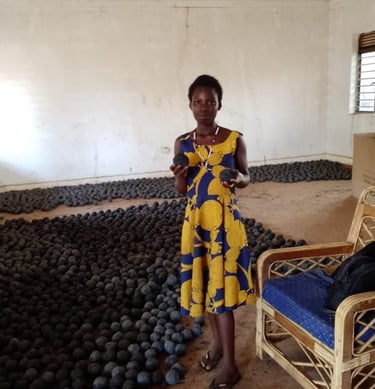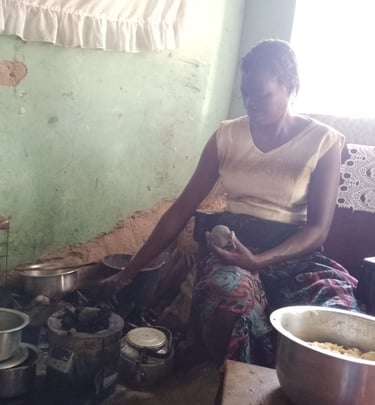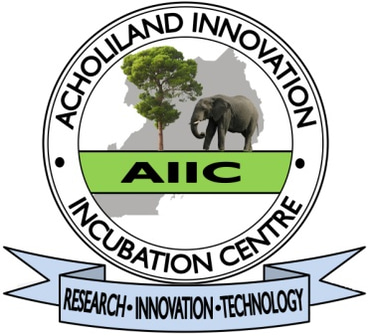Profile
Acholiland Innovation Incubation Centre Uganda Limited (AIIC) is Public-Interest Social Enterprise Development Organization formed in 2019 and works to contribute to sustainable social-economic transformation of communities in the post-conflict Acholi sub-region in Northern Uganda. The organisation is registered with Uganda Registration Services Bureau as a Company Limited by Guarantee without Share Capital; Registration No: 80034436607344. Legal Status: Company Limited by Guarantee.
Why it was Formed
The premier public-interest social enterprise-focused development organization was founded in 2019 by Garbert B. Alichan a local development practitioner with over 35- years’ wealth of experience in the field. He was motivated to form AIIC because of the following reasons; -
The unprecedented trauma and chronic poverty affecting the people of Acholi sub region after enduring 20 years-long violent and destructive insurgency in Northern Uganda; 10 years of which was life under inhuman conditions in Internally Displaced Persons’ (IDP) camps; that needed the local people to be empowered to sustainably exploit the abundant local natural resources and taken charge of their own development.
The great need to create a local platform for multiple stakeholders to contribute to the poverty reduction in the sub region through research, innovation and technology. The different stakeholders are challenged reexamine why old ways that have been employed over time have not produced the desired changes; and, are inspired to explore new ways of actionable solutions to solve people’s problems.
The belief in the wisdom of the Late Kofi Annan- “All our efforts to defeat poverty and pursue sustainable development will be in vain if environmental degradation and natural depletion continue unabated”. For, in the case of Uganda; Acholiland is the epicenter in that regard.
Values and Principles
Our Mission
Empowered, Productive, and Healthy people of Acholi sub region in Northern Uganda
Empowered:
People are made stronger to control their lives and demand their rights
Productive:
People are hardworking and attain better results to transform their lives.
Healthy:
People live in a state of complete physical, mental and social wellbeing.
Our Vision
Critical and Creative Thinking:
We clearly and logically consider information at our disposal; and generate new, novel or useful ideas.
Mutual Partnership:
We establish and maintain meaningful relationships
Empowerment:
We make people stronger to control their life and demand their rights.
Teamwork:
We work together with others for effectiveness and efficiency
Transparency and Accountability:
We demonstrate personal and institutional accountability.
Integrity:
We conduct activities with honesty and responsibility
Real development is local ownership and sufficient capacity to guide the process.
Governments and Agencies provide resources, support and guide; the people are the means and ends.
Poverty will not just go away: Action is needed to fight it.
Our Philosophy
Acholiland (administratively referred to as Acholi sub region) is located in mid-northern Uganda. It comprises of the districts of Kitgum, Agago, Amuru, Gulu, Lamwo, Nwoya, Omoro, Pader and Gulu City as the local government administrative units. The total area size of the sub region is 28,224 kilometer square i.e. 11.68% of Uganda’s area size of 241,559 kilometer square. As of 2024, the population of the sub region stood at 2,044,355 i.e. a population density of 72 persons per kilometer square. The sub region is the second largest in area (after Karamoja sub region at 31,074 km2) and also the second least populated sub region (after Karamoja sub region with having a population of 1,496,117 and a population density of 48 persons per km2). (The 2024 National Population and Housing Census/ Uganda Bureau of Statistics). The vast majority of the population are rural dwellers (over 90%) and more than half are below the age of 18.
The people of the sub-region are slowly recovering from trauma and impoverishment, which are the key effects of the 20-year-long violent and destructive insurgency pitting the Government of Uganda army and the Lord’s Resistance Army (LRA) between 1986 and 2006. The long-enduring effects of the past conflict, coupled with different shocks such as COVID-19 pandemic, climate change, hunger, unprecedented deforestation, and global economic crisis, have further sunk the population into chronic poverty, i.e., intergenerational poverty. The community’s livelihoods depend on subsistence farming and informal small-scale income-generating activities; whereby most of their farm produce is consumed at home while a small percentage is sold to earn very meagre cash incomes to buy basic necessities and meet cost of other social needs such medical care, school fees and clothing.
The people in Acholi sub region are the poorest in Uganda. The 2019/2020 Uganda National Household Survey by Uganda National Bureau of Statistics puts Acholi sub region as the poorest in the country, with the poverty rate standing at 68 percent, way above the national estimate of 47 percent. A combination of factors but mainly the effects of the violent insurgency in Northern Uganda where the sub region was the epicenter, deforestation, climate change, and the government’s weak strategies to rebuild the conflict-affected sub region has continued to impact the sub region’ post-conflict recovery and sustainable development.
Acholi sub region has become the epicenter of forest destruction in Uganda as locals resort to charcoal making and trade for quick cash incomes; and other citizens mainly from Central and Eastern Uganda joined in lumbering and charcoal making on industrial scale. The venture has been counter-productive as massive tree cover across the sub region has been decimated, soil depleted and weather patterns has been worsening. The damage has been massive and destructive such that the environment and livelihoods of the people are now at stake.
Our work focuses on building an economy that provides for a healthy and resilient natural environment; sustainable and abundant energy, food, and housing; prosperous and meaningful livelihoods; and vibrant cultures and inclusive societies. We call this approach, Building an Economy that Provides for a Sustainable Future
Committing to improvement that confronts or solves injustices and inequalities :We strive to empower local communities to stand up, speak out and take action on issues that affect them such as the wanton destruction of forest resources; exploitation by produce dealers/middlemen; loss of domestic animals such as cattle, goats and sheep to rustlers; poor service delivery and corruption.
Embracing Positive Change: We assert that our current economy, which is dependent on ever-increasing growth, resource extraction, unsustainable farming practices, and unrestrained consumption, is fundamentally at odds with the social and environmental needs of the planet. Climate change, global financial instability, geo-political tensions, global supply chain interruptions, and an ever-widening gap between rich and poor, are just the latest indicators of failures of the conventional economic system. We have lost sight of the fact that an economy can, and should, be changed to suit the needs of people and planet.
Building Resilient, Local Economy: AIIC plants the seeds for systems change. Specifically, we work with rural communities in the places they call home — places that are themselves at the edge, where communities have long been exploited by an economy focused on extraction and commodification. However, we are fortunate that there is resilience within these communities, born from a deep connection between people and place. It is here that there is the opportunity to build an economy that, instead of destroying life, provides for life’s resilience and abundance.
Fostering Social Innovation: Our approach focuses on triggering systems change through social innovation: Our work is social — we support communities in creating change for themselves as active participants who take the lead in defining their own futures.
Our work is innovative — our strategies explore alternative solutions, both new and old, that are outside the bounds of the current economic system. Finally, throughout our programs, we focus on demonstrating change on-the-ground, through real, tangible projects that dare to challenge the status quo.
· Leveraging on Technology: Our approach takes technology in its varied forms be it ICT, mechanics, engineering, or agriculture to propel needed changes and benefits to communities.Critically, the characteristics of our approach are:
Innovative. We constantly execute new ideas. Constant development and thinking outside the box are second nature to us.
Proactive. We take the initiative and focus on matters that allow us to make the largest possible difference.
Cooperation. We combine different perspectives in order to find possibilities. There is no right and wrong, but we look for better together.
Scaling up. We are looking for multiplication: we make small initiatives scalable and accessible for larger groups, and we help large initiatives to grow even further.
Unlimited. We do not take existing laws and regulations as a starting point, but we investigate the edges of the law to see what is possible, rather than what is impossible.
Activist. If we perceive injustices, we instantly put them on our agenda and force breakthroughs.
To harness economic power, the strength of consumers, investors, businesses, and the market place - to create an economically resilient, socially just and environmentally sustainable society in Acholi sub region.
To uplift the quality of life for people in Acholi sub-region, Northern Uganda.
Overall Goal
Overall Background &Context of Life
Our Approach
Broad Objectives
To strengthen social-economic transformation for the people in Acholiland through provision of a platform for innovations based on hands-on research and technology.
To enhance marketing of Acholiland in particular, and Uganda in general as a top tourism, trade and investment destination through research, documentation, information dissemination and promotional activities.
To strengthen championing of environmental and climate change stewardship, ethical and sustainable use of natural resources through sensitization, community education, demonstration, partnership, engagement and litigation.
Voices------What The Locals Say
Anirwoth Brenda "The charcoal briquettes are a cost-saving, and burns more intensely than ordinary charcoal"




Amony Filda "Charcoal briquettes is the best cooking fuel to adapt now; energy-packed and long-lasting cooking for hours".
